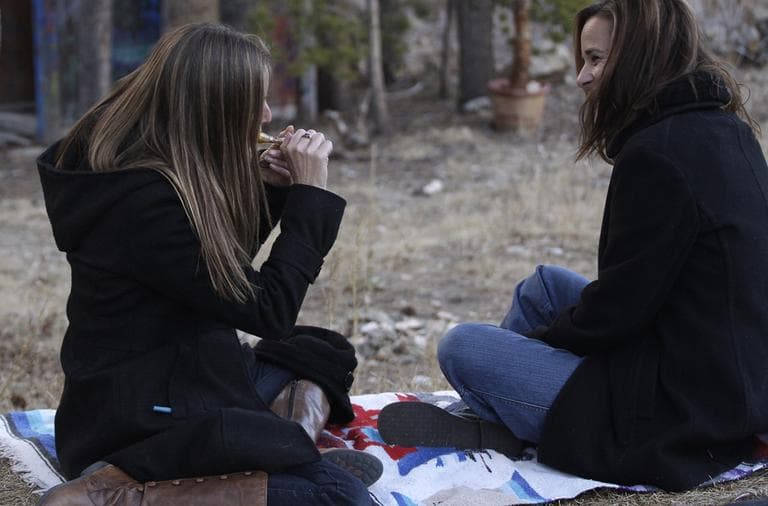Advertisement
Many Colorado Kids View Smoking Pot As Healthy
Resume
Healthy, organic, locally grown. That's how some Colorado teens described marijuana when a group of online news organizations investigated how the legalization of medical marijuana in 2000 has affected young people.
Their attitudes might change even more now that Colorado voters legalized recreational use of marijuana for adults over 21 years old.
"They took to heart that this was healthy. They told us they had aches and pains and marijuana helped them," said Katie Kerwin McCrimmon, a reporter with the online news site Health Policy Solutions.
"They took to heart that this was healthy. They told us they had aches and pains and marijuana helped them."
Katie Kerwin McCrimmon, reporter
Even though medical marijuana can normally only be prescribed to people over 18-years-old, McCrimmon found that many teens were gaining greater access to pot. Medical marijuana dispensaries are ubiquitous, and dozens were set up near schools.
"They'd go out and get high over lunch and told me that it helped them focus in the afternoon, that they'd do better in math and art when they're high," McCrimmon said.
Last summer, the U.S. Attorney's Office in Denver sent letters to dispensaries within 1,000 feet of schools, telling them to move. All 50 of them complied.
Dr. Christian Thurstone, the medical director for an adolescence substance treatment program in Denver and a member of Gov. John Hickenlooper's task force to come up with regulations on recreational use of marijuana, said his young patients seeking addiction treatment would tell him that pot helped them.
- New York Times: Legalizing of Marijuana Raises Health Concerns
"They would say, 'You know, Doc, why would I want to stop this medicine, it helps with me with my anger, my ADHD, it helps me sleep. Why on earth would you ask me to stop this?'" Thurstone said.
"They would say, 'You know, Doc, why would I want to stop this medicine, it helps with me with my anger, my ADHD, it helps me sleep.'"
Dr. Christian Thurstone
But Thurstone says that while marijuana has some medicinal value for adults, it can be very harmful to teens.
- New York Times: Early Marijuana Use Linked to I.Q. Loss
"We've seen, starting in the late 1980s, that adolescents exposed to marijuana have about a two to four-fold increase of developing psychosis. And we also have a good evidence now that adolescence exposure to marijuana may also affect intelligent, cognition, learning and memory," Thurstone said.
Schools And Teen Pot Use
In the past four years, Health Policy Solutions found that Colorado schools saw a 45 percent increase in drug violations, and in Denver, there was a 71 percent hike in cases of schools calling in police for drug violations.
So what can Colorado officials do to get the message to teens that pot use isn't good for them?
Some education officials at the state level are putting out information about harmful events, and some schools are doing education events.
But opponents to legalization say that just like tobacco and alcohol, there will be intensive marketing that will appeal to children.
That's where Dr. Thurstone says Colorado can do a better job.
"We want to avoid the public health disaster of tobacco and hopefully we've learned something from that. What concerns me the most is the commercialization of marijuana, because that creates a tension between public health and safety and then the profit motive. And in order to get a profit, you have to get the new, young users. And that is hopefully what we can avoid," Thurstone said.
The task force is now charged with looking at ways to make sure marijuana doesn't become even more widely available to teens.
"One possibility is to have state-run stores similar to the way 18 other states regulate alcohol and that might be a way to lessen the commercial impact, advertising and marketing, especially to youth," Thurstone said.
- What's your take on teenagers and pot? Let us know in the comments or join the debate on our Facebook page.
Guests:
- Katie Kerwin McCrimmon, reporter for Health Policy Solutions.
- Dr. Christian Thurstone, medical director of a youth substance abuse treatment clinic in Colorado, and associate professor of psychiatry at the University of Colorado Denver.
This segment aired on January 17, 2013.